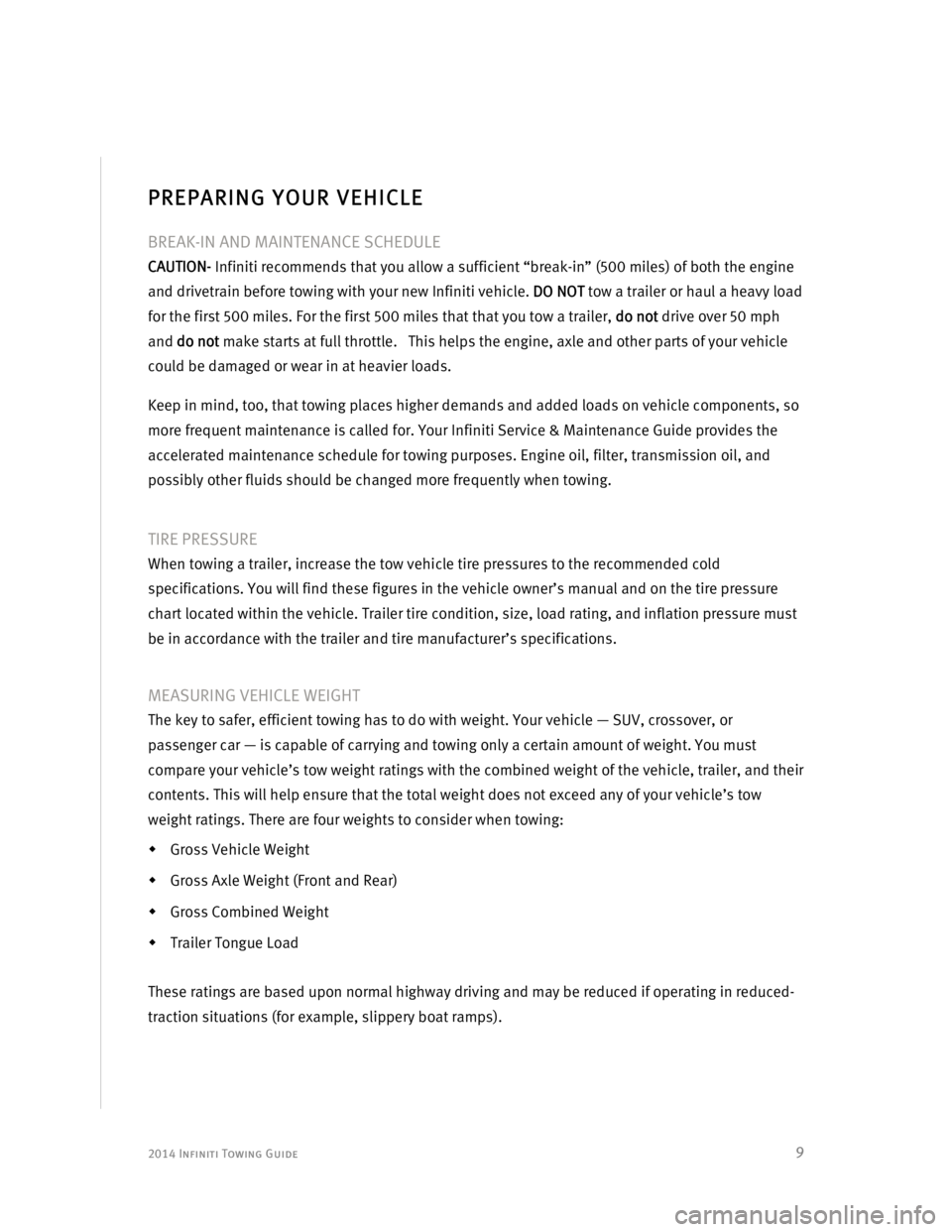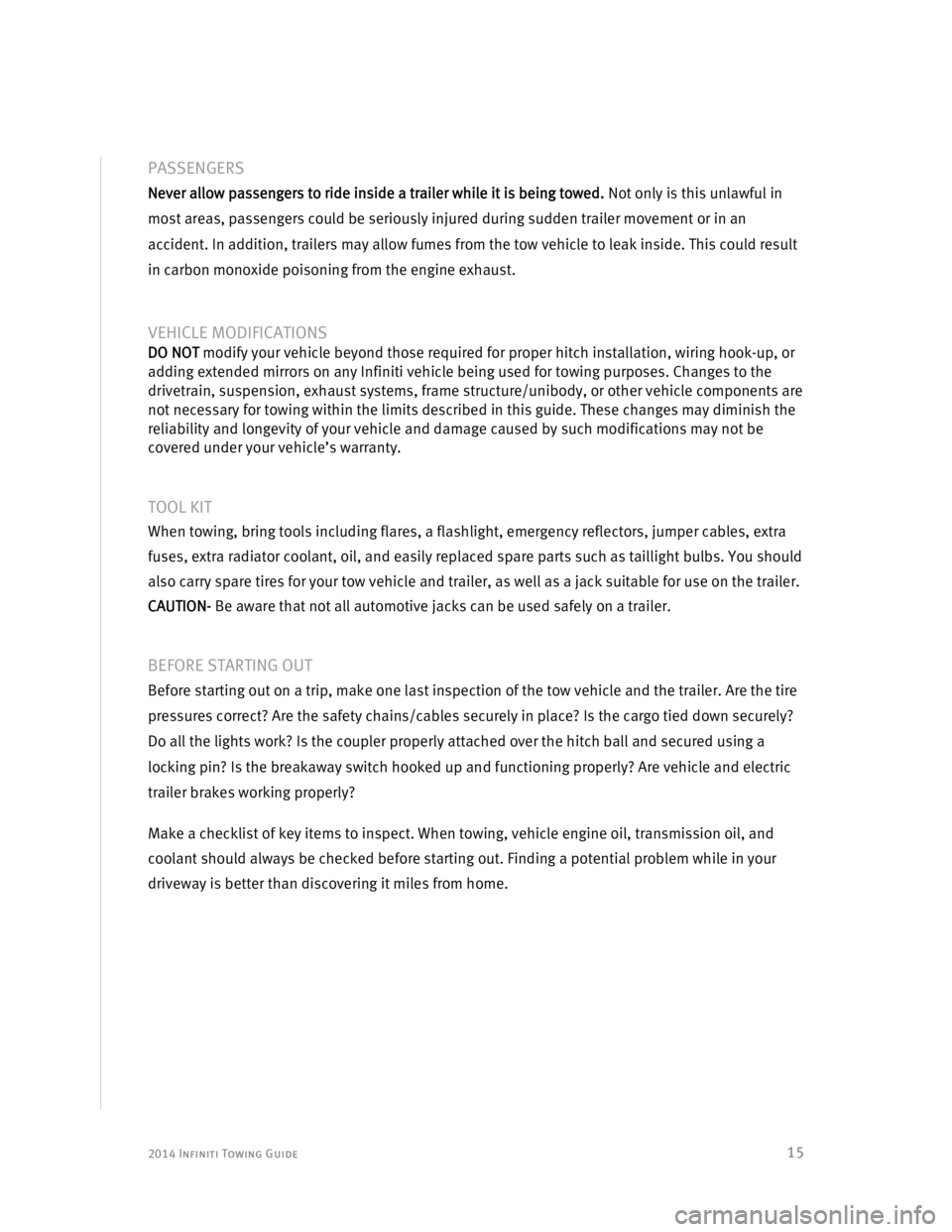key INFINITI Q70 HYBRID 2014 Towing Guide
[x] Cancel search | Manufacturer: INFINITI, Model Year: 2014, Model line: Q70 HYBRID, Model: INFINITI Q70 HYBRID 2014Pages: 25, PDF Size: 0.88 MB
Page 10 of 25

2014 Infiniti Towing Guide
9
PREPARING YOUR VEHICLE
BREAK-IN AND MAINTENANCE SCHEDULE
CAUTION- Infiniti recommends that you allow a sufficient “break-in” (500 miles) of both the engine
and drivetrain before towing with your new Infiniti vehicle. DO NOT tow a trailer or haul a heavy load
for the first 500 miles. For the first 500 miles that that you tow a trailer, do not drive over 50 mph
and do not make starts at full throttle. This helps the engine, axle and other parts of your vehicle
could be damaged or wear in at heavier loads.
Keep in mind, too, that towing places higher demands and added loads on vehicle components, so
more frequent maintenance is called for. Your Infiniti Service & Maintenance Guide provides the
accelerated maintenance schedule for towing purposes. Engine oil, filter, transmission oil, and
possibly other fluids should be changed more frequently when towing.
TIRE PRESSURE
When towing a trailer, increase the tow vehicle tire pressures to the recommended cold
specifications. You will find these figures in the vehicle owner’s manual and on the tire pressure
chart located within the vehicle. Trailer tire condition, size, load rating, and inflation pressure must
be in accordance with the trailer and tire manufacturer’s specifications.
MEASURING VEHICLE WEIGHT
The key to safer, efficient towing has to do with weight. Your vehicle — SUV, crossover, or
passenger car — is capable of carrying and towing only a certain amount of weight. You must
compare your vehicle’s tow weight ratings with the combined weight of the vehicle, trailer, and their
contents. This will help ensure that the total weight does not exceed any of your vehicle’s tow
weight ratings. There are four weights to consider when towing:
�Š Gross Vehicle Weight
�Š Gross Axle Weight (Front and Rear)
�Š Gross Combined Weight
�Š Trailer Tongue Load
These ratings are based upon normal highway driving and may be reduced if operating in reduced-
traction situations (for example, slippery boat ramps).
Page 16 of 25

2014 Infiniti Towing Guide
15
PASSENGERS
Never allow passengers to ride inside a trailer while it is being towed. Not only is this unlawful in
most areas, passengers could be seriously injured during sudden trailer movement or in an
accident. In addition, trailers may allow fumes from the tow vehicle to leak inside. This could result
in carbon monoxide poisoning from the engine exhaust.
VEHICLE MODIFICATIONS
DO NOT modify your vehicle beyond those required for proper hitch installation, wiring hook-up, or
adding extended mirrors on any Infiniti vehicle being used for towing purposes. Changes to the
drivetrain, suspension, exhaust systems, frame structure/unibody, or other vehicle components are
not necessary for towing within the limits described in this guide. These changes may diminish the
reliability and longevity of your vehicle and damage caused by such modifications may not be
covered under your vehicle’s warranty.
TOOL KIT
When towing, bring tools including flares, a flashlight, emergency reflectors, jumper cables, extra
fuses, extra radiator coolant, oil, and easily replaced spare parts such as taillight bulbs. You should
also carry spare tires for your tow vehicle and trailer, as well as a jack suitable for use on the trailer.
CAUTION- Be aware that not all automotive jacks can be used safely on a trailer.
BEFORE STARTING OUT
Before starting out on a trip, make one last inspection of the tow vehicle and the trailer. Are the tire
pressures correct? Are the safety chains/cables securely in place? Is the cargo tied down securely?
Do all the lights work? Is the coupler properly attached over the hitch ball and secured using a
locking pin? Is the breakaway switch hooked up and functioning properly? Are vehicle and electric
trailer brakes working properly?
Make a checklist of key items to inspect. When towing, vehicle engine oil, transmission oil, and
coolant should always be checked before starting out. Finding a potential problem while in your
driveway is better than discovering it miles from home.